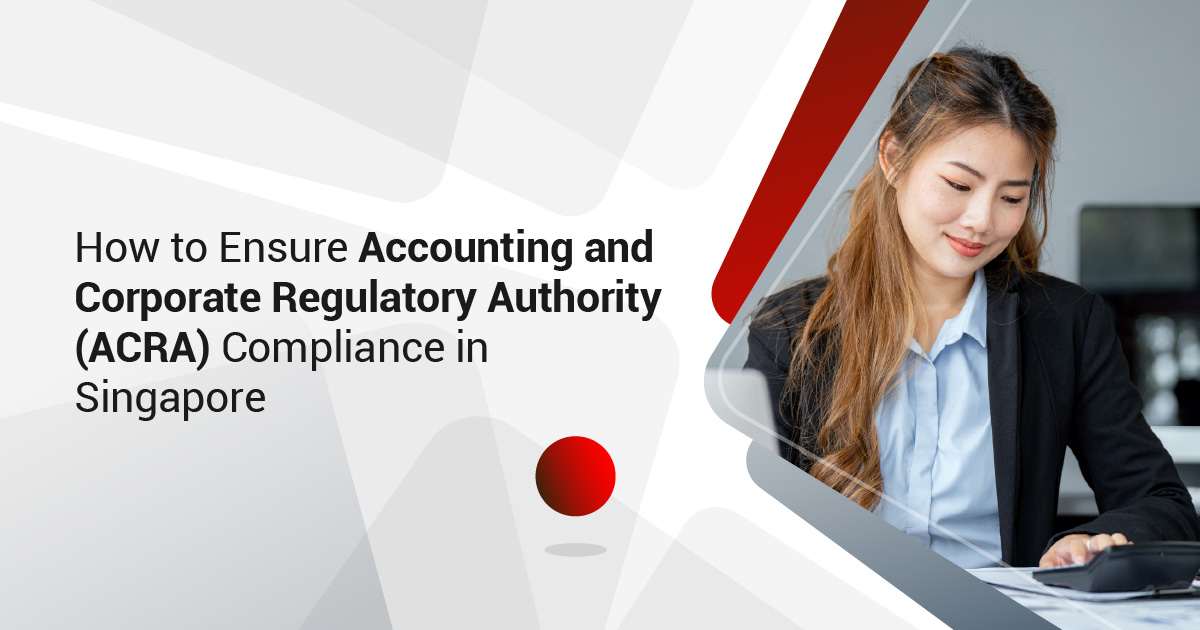For any company operating in Singapore, the Accounting and Corporate Regulatory Authority (ACRA) is the central governing body that sets the rules for corporate conduct. Achieving and maintaining compliance with ACRA is a legal formality and a fundamental aspect of good corporate governance that builds trust, enhances credibility, and safeguards your business from significant penalties.
Navigating its requirements, however, can be a complex undertaking. This guide provides a structured overview of how to ensure your business remains compliant with ACRA. We share more about the essential filing obligations, record-keeping standards, and corporate governance practices every Singapore-based company must follow. Understanding these requirements is the first step toward seamless and effective business administration.

Key Takeaways
- Compliance with ACRA revolves around three key areas: timely annual filings, meticulous record-keeping, and adherence to corporate governance principles. These practices promote transparency, accountability, and trust.
- Companies must file Annual Returns (AR) and financial statements with ACRA. The AR validates key company details, while financial statements provide transparency to stakeholders. Small companies may qualify for audit exemptions but must still prepare unaudited financial statements.
- Accurate and up-to-date statutory registers, such as the Register of Directors, Members, and Registrable Controllers, are mandatory. These records enhance corporate transparency and must be updated promptly.
- Non-compliance can result in financial penalties, enforcement actions, strike-offs, and reputational damage, making it critical to prioritise ACRA compliance.
The Core Pillars of Accounting and Corporate Regulatory Authority (ACRA) Compliance
ACRA’s framework is designed to promote transparency and accountability. Compliance revolves around three core pillars:
- Timely submission of annual filings
- Meticulous maintenance of company records
- Adherence to corporate governance principles
Mastering these areas ensures your business operates within the legal boundaries set by Singaporean law. Staying compliant reinforces your company’s reputation as a reliable and well-managed entity, which is attractive to investors, partners, and customers. Conversely, non-compliance can lead to severe consequences, including financial penalties, legal action against company directors, and, in some cases, being struck off the register.
Key Annual Filing Obligations
One of the most critical aspects of ACRA compliance is the timely submission of annual returns and financial statements. These filings provide a yearly update on the company’s status and financial health.
Filing Annual Returns (AR)
Every Singapore-incorporated company must file an AR with ACRA. This document validates key information about the company, including the names of its directors, secretary, and shareholders, as well as the registered address. The deadline for filing is within seven months of the company’s Financial Year End (FYE).
The Annual General Meeting (AGM) is a prerequisite for this filing. During the AGM, the company’s financial statements are presented to the shareholders for approval. Once approved, the Annual Return can be filed. Failure to file on time can result in late filing penalties and enforcement action.
Submitting Financial Statements
Unless exempted, companies are required to file their financial statements with ACRA, prepared in accordance with the Singapore Financial Reporting Standards (SFRS). These statements must be audited by a certified public accountant. The filed statements become public documents, offering transparency to stakeholders.
Certain small companies may qualify for an exemption from auditing their accounts. A company is considered a “small company” if it is a private company and meets at least two of the following three criteria for the preceding two consecutive financial years:
- Total annual revenue is not more than S$10 million.
- Total assets are not more than S$10 million.
- The total number of employees is not more than 50.
Even if exempt from an audit, these companies must still prepare and file unaudited financial statements.
Related Read: Guide to ACRA BizFile for Foreign Investors in Singapore
Maintaining Proper Records and Registers
Accurate and up-to-date records are the foundation of ACRA compliance. ACRA mandates that companies maintain several statutory registers at their registered office.
Register of Directors, Secretaries, and Auditors
This register must contain the personal particulars of each officer, including their full name, address, nationality, and date of appointment or cessation. Any changes must be updated promptly, as ACRA requires notification of changes to company officers within 14 days.
Register of Members (Shareholders)
The register of members details who owns the company. It includes the names and addresses of all shareholders, the number of shares each holds, and the date they were entered into the register.
Register of Registrable Controllers (RORC)
To enhance corporate transparency and combat money laundering, companies are required to maintain a Register of Registrable Controllers. This register identifies the individuals or legal entities that have significant interest or control over the company. The information in this register must be kept current and submitted to the central ACRA register.
Adhering to Corporate Governance Standards

Beyond filings and record-keeping, ACRA compliance extends to upholding sound corporate governance. This involves ensuring the company is managed responsibly and ethically.
Appointment of Key Officers
Every company must appoint qualified individuals to key positions. This includes:
- At least one director who is ordinarily resident in Singapore.
- A qualified company secretary who is a resident of Singapore. The sole director of a company cannot also be the company secretary.
These officers have specific duties and responsibilities under the Companies Act. Directors, for instance, are legally obligated to act in the best interests of the company and exercise a reasonable degree of care, skill, and diligence.
Notifying ACRA of Changes
Businesses are dynamic, and changes are inevitable. ACRA must be notified of any changes to the company’s statutory information. This includes alterations to the company name, registered office address, business activities, or share capital. Most of these changes must be reported within 14 days. Prompt notifications ensure the public register remains accurate.
The Consequences of Non-Compliance

ACRA takes non-compliance very seriously. The penalties are designed to deter negligence and willful default, ensuring the integrity of Singapore’s corporate ecosystem.
Potential consequences include:
- Financial Penalties: Late filing fees are imposed for overdue Annual Returns. Fines can also be levied for breaches of the Companies Act.
- Enforcement Action: ACRA may issue court summons to company directors who fail to comply with their statutory obligations.
- Strike-Off: For companies that are persistently non-compliant, ACRA may strike the company’s name off the register, effectively dissolving the business.
- Reputational Damage: A poor compliance track record can damage a company’s reputation, making it difficult to secure financing, attract talent, or win new business.
Making ACRA Compliance a Priority
Ensuring compliance with ACRA should be a proactive, ongoing process, not a reactive, last-minute scramble. By integrating these practices into your regular business operations, you can maintain good standing and build a strong foundation for sustainable growth. Accurate record-keeping, timely filings, and sound governance are hallmarks of a professionally managed enterprise.
While the requirements are clear, managing them can be a time-consuming and complex task, especially for businesses focused on expansion. Partnering with a professional corporate services provider such as InCorp can offload this administrative burden and provide expert guidance.
Ensure Your Business Stays Compliant With InCorp
Navigating ACRA’s regulatory landscape requires diligence and expertise. Our team of corporate governance specialists provides comprehensive support to ensure your business meets all statutory requirements, from annual filings to maintaining registers. Let us handle the complexities of compliance so you can focus on driving your business forward. Contact us today to find out more!
FAQs about Accounting and Corporate Regulatory Authority (ACRA) Compliance
What is the accounting and corporate regulatory authority?
- It is Singapore's national regulator for business entities, public accountants, and corporate service providers.
How to check if a company is registered with ACRA?
- You can use ACRA's official online platform, BizFile+ to check if a company is registered with them.
How can InCorp help?
- We can help in various aspects, such as in corporate secretarial services like conducting AGMs and more.


